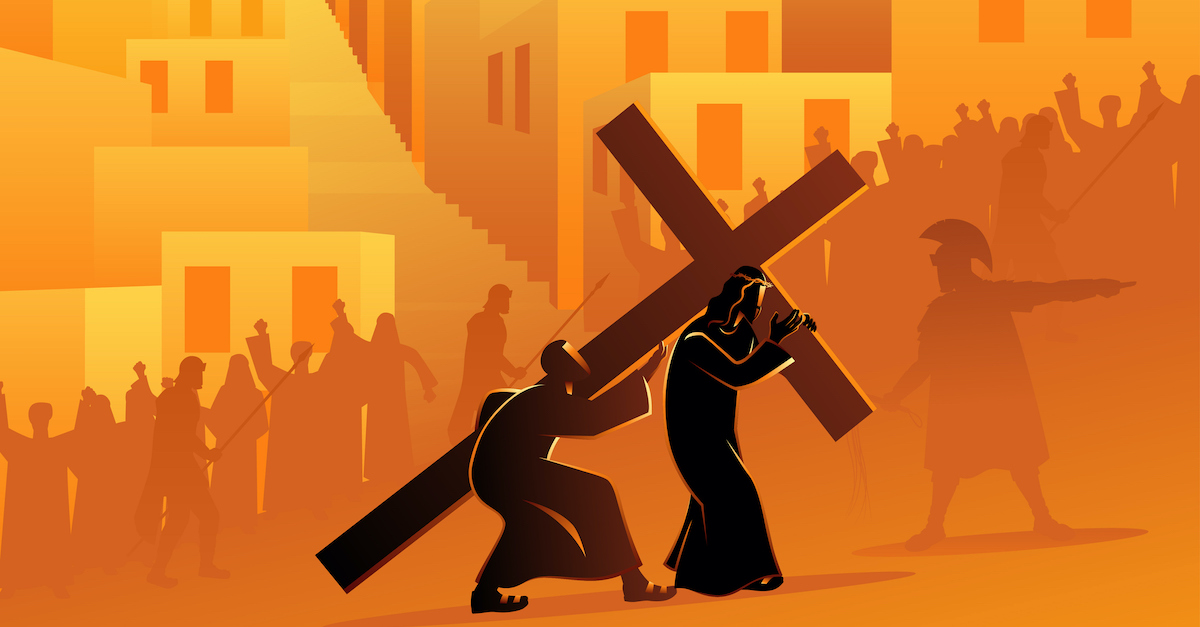By Stephen Leonard
“And they compelled a passerby, Simon of Cyrene, who was coming in from the country, the father of Alexander and Rufus, to carry His cross.” Mark 15:21
Jesus was in a pitiful state when He was forced to carry His instrument of crucifixion, a heavy wooden cross, through the city, out the city gate, to Golgotha, the hill called “Place of a Skull,” also known as Mount Moriah (see Genesis 22). He had been flogged and beaten. He had lost significant blood. He was already extremely injured and even possibly close to death.
Perhaps the movie, “The Passion of the Christ” can help one visualize this, though the Scriptures are just as graphic in literary description. Gibson, the film producer and director, desired to follow the Scriptures in his film word for word. It is safe to say Jesus was in such a condition that he could have collapsed and died while carrying the cross to the place He was to be crucified.
But the Roman soldiers were commissioned with orders to see He was indeed crucified. So they could not let him die before that. Seeing His dangerous state, they forcibly grabbed a passerby and compelled him, the Scriptures say, to carry the Savior’s cross, while Jesus barely stumbled His way up to Golgotha in weakness, pain, and agony.
This passerby who was entering Jerusalem from the country at the precipitous moment was one Simon of Cyrene from North Africa, visiting Jerusalem without awareness at the exact time of Jesus’ trial and crucifixion. If the Bible speaks of a man by name, and even more, his sons, you better pay attention. Such a man is important to God’s own purposes to have their names recorded in His Word.
From the world’s perspective, this was a “chance encounter.” From God’s action and purposes, Simon of Cyrene was not only intended to be there when needed, but God moved the Roman soldiers to grab him and force him specifically to carry Jesus’ cross upon pain of retribution. He was given no opportunity to refuse what the Roman soldiers demanded of him. Make no doubt about it; however, this was no chance encounter; it was according to God’s plan.
Simon of Cyrene was a man, possibly of dark skin, from an African area corresponding to modern-day Libya. But he was also most probably a worshipping Jew, for there happened to be a Synagogue built in Jerusalem for Jews from the Jewish population of Cyrene. Possibly Simon and his family were there for the Feast of Passover the day before. But he apparently knew nothing of Jesus, his disciples, nor his arrest and hastened night, truly mock trial, or His determinate punishment of crucifixion.
This encounter was likely the beginning of Simon’s conversion to becoming a true disciple of Jesus Christ, though this is not actually mentioned. Otherwise, I do not think his name would have been written here. The Scriptures would have just said an onlooker was pressed into carrying Jesus’ cross.
Simon remained to observe the most important death in the history of the world, not only seeing how the Savior humbly and forgivingly died, but hearing his last words from the cross.
His sons, Rufus and Alexander, also recorded here by Mark, are most likely the same mentioned by name later in the New Testament as active cohorts of the followers of the Lamb, along with the Apostle Paul, who even spoke of Rufus’ mother as caring helpfully for him. (see Romans 16:13). Tradition tells us Simon himself went back to North Africa as an active kingdom builder in the fledgling church of his Lord.
No, this was no chance encounter! This was God by the activity of the Holy Spirit drawing a man from Cyrene in North Africa to himself in a most dramatic way in order to build his church in that part of the world.
When Jesus comes into your life, it is no chance encounter. It is not a random act. You may think it so from your own perspective. But God has set His heart on you from the foundation of the world. He loves you with an everlasting love, and no man can ever pluck you from the Savior’s hand. It was so with Simon, Alexander, and Rufus. One day you can talk with them about it.
Encouragement
“Upon the cross of Jesus, mine eye at times can see the very dying form of One who suffered there for me; and from my stricken heart with tears two wonders I confess, the wonders of redeeming love and my unworthiness.”
(2nd Verse of Elizabeth Clephane’s hymn, “Beneath the Cross of Jesus,” 1872)
Stay Updated
Sign up for our monthly newsletter and weekly devotional










